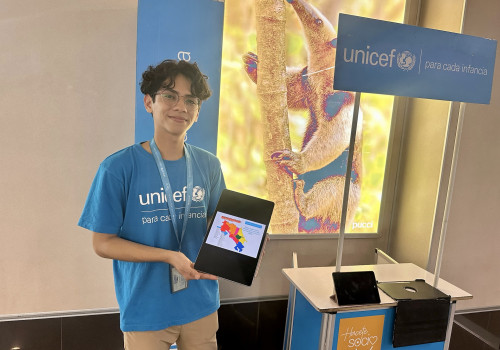PARTNERSHIP BETWEEN AERIS AND UNICEF

Passengers at Juan Santamaría Airport can support children in vulnerable communities
- Costa Rica’s main air terminal dedicates a space for those interested in making a voluntary monthly contribution. With the funds raised in the last two months, 282 educational resource kits have been provided.
- Entities join efforts to create a safe space in a community near AIJS, so that children have access to protection from violence and discrimination and improve their educational opportunities.
December, 2023. Passengers transiting through the Juan Santamaría International Airport (AIJS) will be able to become donors for the benefit of vulnerable children, thanks to an alliance between AERIS, the airport’s manager, and the United Nations Children’s Fund (UNICEF).
“AERIS establishes within its strategic lines of sustainability the support and generation of projects that benefit children’s education and child welfare. We are honored to work together with UNICEF, as it is an ally that identifies with our strategy and has a high reputation in terms of governance and generation of results,” said Ricardo Hernandez, CEO of AERIS.
The campaign supports UNICEF’s Hazte Socio initiative, which is being carried out simultaneously in more than 50 countries, and those interested can join with a voluntary monthly contribution. In the case of AIJS, there is a team identified to receive potential donors in a stand, which is located in the central aisle of the boarding areas of the main air terminal of the country.
During the month of October and November of this year, more than 470 new “partners” were counted, which translates into the contribution of 282 educational resource kits for children in vulnerable situations. The kits include supplies and materials for early childhood development. In addition, the initiative seeks to support schoolchildren with uniforms and computers.
“AERIS is a key ally given its interest in the development of various initiatives aimed at protecting the rights of this population, as well as reaching hundreds of people. In this way, UNICEF can raise awareness among members of the airport community about the issues affecting children and encourage the defense of their rights,” said Juan Manuel Baldares, Acting Representative of UNICEF Costa Rica.
How to donate at AIJS?
At the stand, registration and the first donation will be made through a tablet that has all the required data protection and security measures. With the clarification that, by internal policy and as a security measure, UNICEF does not receive cash.
Once the first disbursement is made, subsequent monthly donations of the agreed amount will be made automatically. In addition, members will receive periodic information in their e-mails about the positive impact of their contribution in the different programs to which they are destined.
Support for education
The focus of the alliance between AERIS and UNICEF is to support education by promoting the development of skills and school continuity in vulnerable populations in different areas of the country such as Los Chiles, Pococí, Sarapiquí, Tilarán, Puntarenas, Coto Brus, Talamanca, La Cruz, among others, with the expectation of generating a positive impact on more than 12,000 children.
This campaign has an execution period of one year; however, aligned with AERIS’ commitment to education and child welfare, it will be extended for as long as the parties agree, to address other issues such as nutrition, violence and inclusion.
“Both institutions are looking to develop other synergies for the benefit of children. Costa Rica’s main terminal will maintain its objective of contributing to the growth of new generations that are educated, protected, prosperous, healthy and resilient,” said Adriana Bejarano, head of Environment, Health and Safety at AERIS.
Similarly, as part of the joint work, a project is currently underway to create a safe space in the community Vistas de Santa Maria, in Alajuela, which is adjacent to the airport and is considered a vulnerable community, where there is an important opportunity to contribute to the development of children in the area of influence and impact of AIJS.
The plan includes the creation of this safe space for children to have access to protection from violence and discrimination and to improve their educational opportunities. The space will be equipped according to the needs of the children in the area, such as didactic resources and a sports area. The first phase of the project, which consisted of identifying the requirements of the underage population and their parents, was completed this year. In 2024, the space will be ready for use.
About AERIS Costa Rica
AERIS HOLDING COSTA RICA is a company of the CCR Group, which operates under the management model interested in the Juan Santamaría International Airport (AIJS), being in charge of its operation, maintenance, rehabilitation, construction, financing and promotion.
The company seeks to exceed the expectations of its stakeholder management contract in a cross-cutting manner to sustainability, generating social, environmental and economic value. AERIS is committed to providing a “Pura Vida” travel experience for passengers transiting through the main gateway to the country and to generate positive impact to Costa Rica and its stakeholders.
AERIS draws on the experience of its parent companies: HAS Development Corporation and Grupo CCR of Brazil, the latter as the main shareholder and with stakes in the international airports of Quito Ecuador, Curacao and Belo Horizonte in Brazil.
It currently connects Costa Rica with 37 destinations around the world, through 25 international commercial airlines and two domestic airlines that operate from its facilities.
About UNICEF: UNICEF works in some of the toughest places to reach the world’s most disadvantaged children. In 190 countries and territories, we work for every child, everywhere, to build a better world for all.
For more information about UNICEF and its work for children, please visit https://www.unicef.org/costarica.
For more media information, please contact: Ximena Alfaro, [email protected]
Ronny Gudiño, [email protected]
Xinia Miranda Cascante, UNICEF Costa Rica, [email protected]